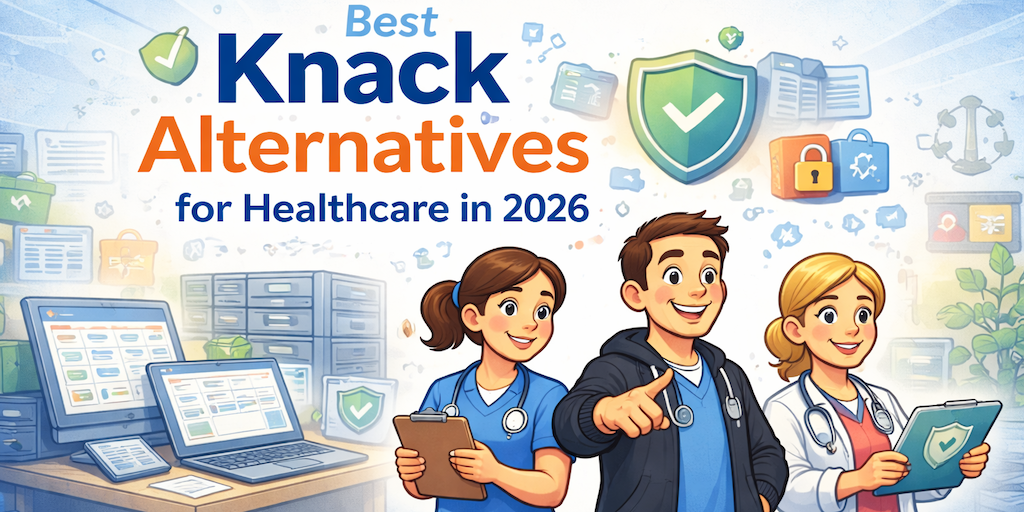AI Agents in Healthcare: Integration, Benefits, Challenges, Use Cases
Let’s face it — the healthcare AI gold rush has produced more sizzle than steak. You’ve seen the flashy demos. Maybe even greenlit a pilot or two. But if you’re a pragmatic clinical tech leader balancing budget, burnout, and bureaucracy — you’re not here for toys. You’re here for tools that deliver. Now.
That’s where healthcare AI agents come in. Not the overhyped, GPT-wrapped chatbots. We’re talking embedded assistants that lighten admin loads, triage patient questions, and plug directly into your EHR stack. When done right, they don’t just exist — they reduce costs, increase efficiency, and actually make clinicians’ lives better.
This blog isn’t a cheerleading session. It’s your tactical blueprint: what healthcare AI agents can (and can’t) do, how to integrate them into your tech stack without drowning in consultants, and why Specode’s ready-made, HIPAA-compliant components might just be your shortcut to real-world impact. Let’s get into the business value — minus the fluff.
Key Takeaways
- Legacy integration is the real bottleneck
Despite the hype, most AI projects stall due to EHR complexity, not model performance. Teams succeeding with a health AI agent focus on integration realism — using plug-and-play connectors and modular components to bypass costly rewrites.
- Start narrow to scale fast
Use cases like appointment scheduling, refills, and documentation summaries show real ROI fast. A targeted AI-powered health care agents deployment avoids scope creep and helps validate the value before expanding system-wide.
- Customization doesn’t have to mean complexity
Specode proves that launching a tailored AI agent for healthcare no longer requires months of dev work. With HIPAA-ready modules and full code ownership, teams are skipping to scalable builds — without sacrificing flexibility or compliance.
What Are AI Agents in Healthcare, Really?
Forget the buzzwords — an AI agent for healthcare isn’t just a chatbot with a fancy vocabulary. It’s an autonomous, context-aware assistant powered by artificial intelligence and large language models (LLMs), designed to interact with clinical systems, parse messy real-world data, and support both patients and providers across the care continuum.

Think of an AI health agent as a silent team member that can monitor patient inputs, navigate EHR workflows, assist with documentation, and even follow up with patients — all without human hand-holding. Whether embedded in a mental health app development platform or integrated into a virtual care tool, these agents are built to reduce administrative burden and boost efficiency, not create new overhead.
The real differentiator? These aren’t static scripts. They learn, adapt, and stay contextually aware within complex healthcare workflows. But here’s the kicker: they only create value when grounded in the right technology, compliance, and healthcare app development strategy. Otherwise, they’re just another shiny object in the AI arms race.
Why Now? The Business Case for AI Agents
Healthcare isn’t suffering from a shortage of innovation — it’s suffering from a shortage of implementation that actually moves the needle. The rise of AI agents for healthcare isn’t about novelty; it’s about necessity. Let’s look at why 2025 is the tipping point.
Burnout Is Breaking the System
Clinician burnout is costing U.S. health systems an estimated $4.6 billion annually in turnover and reduced productivity (Becker’s Hospital Review). Administrative burden — not clinical complexity — remains one of the primary culprits.
A well-integrated health AI agent can automate repetitive tasks like scheduling, documentation, and follow-ups, freeing up time for high-value care.

Patients Expect Instant Answers
Thanks to Amazon and Uber, your patients don’t want to “leave a message.” They expect 24/7 digital interfaces, especially for chronic condition management and post-visit support. AI agents offer always-on service without hiring more staff — a must-have in today’s value-based care landscape.
Operational Costs Are Unsustainable
According to McKinsey, hospitals could reduce up to 25% of administrative spending through automation. AI agents are the most direct path to that outcome — lean digital transformation that avoids a 12-month rollout and bloated IT spend.
Fear: “This Will Take Months and Consultants”
It doesn’t have to. Modern frameworks like Specode let you implement AI agents quickly, with out-of-the-box EHR integration, built-in security, and modular components. You’re not starting from scratch — you’re starting from a smarter place.
Integration Challenges (and Why Most AI Initiatives Fail)
Most AI agents in healthcare don’t stumble because the models are bad — they fail when faced with the messy reality of healthcare integration.
Legacy Systems, Meet Modern Ambitions
Even the smartest AI-powered healthcare agents must navigate a chaotic stack of legacy EHRs, billing tools, and scheduling software. They’re expected to coordinate appointment booking, manage medication refills and reminders, and support workflow management across diagnoses, tests, treatment, and medical records — often in real time.
Here’s the catch:
- HL7/FHIR “support” doesn’t mean easy integration.
- Many hospital systems still run HL7 v2, resisting modern APIs.
- Real-time sync is rare; duct-taped workflows are the norm.
McKinsey reports that EHR integration remains one of the top barriers to healthcare AI adoption — often eating up more time and budget than the AI build itself.
Discover how to improve patient intake efficiency in detail with solutions designed for seamless EHR integration and streamlined workflows.

Compliance: The Minefield
Deploying AI agents in healthcare isn’t just a tech play — it’s a regulatory one.
HIPAA, SOC2, and HITRUST compliance aren’t optional. AI-driven decisions around diagnoses or treatment must be fully auditable. And yes, that means proving your AI didn’t hallucinate a medication refill or change a medical record without oversight.
Without governance features — like human-in-the-loop workflows, traceability logs, and authorization protocols — your AI agent is a lawsuit waiting to happen.
Why AI Projects Die After the POC
Becker’s notes that nearly 70% of healthcare AI pilots stall post-PoC. Common reasons:
- AI vendors focus on the model, not the infrastructure.
- Lack of alignment with security and IT operations.
- Shadow IT, unscalable codebases, and ballooning dev cycles.
A Faster, Smarter Way Forward
Instead of custom-coding everything, leading teams now use low-code and white-label solutions designed specifically for telemedicine app development, appointment booking, workflow management, and more.
Platforms like Specode offer:
- Prebuilt, HIPAA-compliant AI components
- Plug-and-play EHR connectors
- Fast deployment of AI-powered healthcare agents with real use cases (from medication reminders to test coordination)
The takeaway? Success isn’t just about great AI. It’s about seamless integration, built-in compliance, and delivering ROI fast — before your budget or patience runs out.
Use Cases That Actually Work (And Scale)
While it’s tempting to imagine generative AI handling every clinical task under the sun, real-world success with a healthcare AI agent hinges on solving narrow, painful problems — at scale. Here are the use cases actually delivering ROI right now — and how smart teams are using them to automate the grind, not replace the human touch.
Appointment Scheduling and Reminders
Challenge: Front-desk overload and missed appointments
ROI: Increased visit adherence, reduced no-shows, staff time saved
Healthcare AI agents are streamlining scheduling — confirming appointments, sending automated reminders, and even adjusting times via patient text interactions. HealthTech Magazine reports clinics using AI for scheduling have seen up to a 40% drop in no-show rates. It’s one of the fastest wins in health app development, especially for clinics drowning in manual outreach.

Medication Refills and Adherence Tracking
Challenge: Non-adherence impacts outcomes and reimbursement
ROI: Improved patient compliance, lower readmission rates
Instead of relying on overworked staff or clunky patient portals, generative AI-powered agents can handle medication refills, remind patients to take doses, and even alert providers when adherence drops. WHO estimates that only 50% of patients with chronic conditions follow long-term therapy — a gap AI can help close with proactive nudges and refill flows.
Patient Q&A Agents
Challenge: Call center overload, long wait times
ROI: Reduced operational costs, improved patient experience
Deploying an AI-powered Q&A agent lets patients get fast answers to common concerns — without tying up clinical staff. Think: “What should I do before my MRI?” or “Is this side effect normal?” This reduces call volume and frees up resources, especially for high-volume specialties.
Admin Agents: Chart Summaries and Documentation Checks
Challenge: Clinician burnout from charting and audits
ROI: Time saved, improved documentation quality, fewer billing issues
AI agents are increasingly used to automate backend tasks like summarizing visit notes, extracting key details from unstructured text, and flagging incomplete documentation. These healthcare AI agents reduce the manual load on providers and ensure cleaner records for billing and compliance. When paired with EHR integration, they can surface relevant patient history during encounters — no extra clicks required.
Real-World AI Agent Deployments
Here are three concise examples showcasing how AI technology translates into practical, real-world healthcare solutions:
1. AI-Enhanced EHR Data Assistant
Challenge:
Internal project teams faced constant friction accessing up-to-date project details, discussions, and statuses due to scattered documentation across multiple platforms (Slack, CRM).
Solution:
We developed an AI-powered chatbot embedded within Slack, capable of retrieving project-specific data on-demand. It seamlessly accessed a regularly updated knowledge base, intelligently matching user queries, providing summarized context from conversations, and allowing quick filtering by project phase or timeframe.
Underlying Tech:
- Slack (Slack Bolt framework)
- Gemini AI (advanced NLP and summarization)
- Supabase (centralized knowledge database)
- Python (backend orchestration and data connectors)
Translation to Medical Practice:
In healthcare, this solution becomes an AI assistant that enables clinicians to instantly retrieve patient data, test results, and treatment histories directly within their EHR interface or as a standalone conversational tool. The AI agent significantly reduces administrative friction by intelligently summarizing relevant patient details on-demand.
Key Capabilities:
- Conversational Data Retrieval: Clinicians use natural language to instantly access patient information without navigating complex EHR interfaces.
- Contextual Responses: The agent understands conversational context, allowing for smooth follow-up queries within the same thread.
- Automated Data Updates: Regularly syncs data from the EHR backend, ensuring clinicians always have the latest information without manual intervention.
- Seamless Integration: Easily plugs into an EHR or popular enterprise communication tools, streamlining existing workflows rather than disrupting them.
Built for Healthcare with Specode:
Specode enables rapid deployment of this assistant in a fully HIPAA-compliant environment. With prebuilt connectors and secure modular components, you can implement this tool directly into your workflow — without sacrificing compliance or customizability.
2. Proactive Patient Intake & Insurance Verification Chatbot
Challenge:
Collecting initial project requirements from potential clients manually was slow, inefficient, and often incomplete, delaying project kick-offs.
Solution:
We built a conversational chatbot embedded on our website to proactively engage prospects, ask adaptive, contextually-aware questions, collect detailed project requirements, and deliver cost and timeline estimates faster.
Underlying Tech:
- Pickaxe (embedded conversational UI)
- Anthropic Claude 3.7 AI model (context-aware conversations)
- Zapier (automated notifications and lead routing)
- Document upload capability for detailed requirements capture
Translation to Medical Practice:
Clinics and healthcare providers can embed this conversational AI directly into their websites or patient portals. The AI proactively gathers patient insurance details, verifies coverage instantly, and conducts adaptive intake assessments—streamlining the administrative load for front-desk staff and improving patient engagement.
Key Capabilities
- Interactive Intake: Conversationally engages patients to gather necessary details—symptoms, appointment reasons, insurance information—reducing in-clinic waiting time.
- Real-Time Insurance Verification: Validates patient insurance coverage instantly, flagging any issues or missing details proactively.
- Adaptive Conversations: Uses advanced AI to recognize context and dynamically adjust follow-up questions based on previous answers, ensuring complete and accurate data collection.
- Seamless Lead Routing: Automatically sends collected patient data directly to the EHR and schedules follow-up tasks for administrative staff, streamlining operational workflows.
Built for Healthcare with Specode:
Using Specode, this type of chatbot can be securely integrated into your tech stack with baked-in HIPAA compliance, full code ownership, and plug-and-play APIs — ensuring rapid, regulation-ready deployment tailored to your clinic’s needs.
3. Voice-Enabled Appointment Scheduling Assistant
Challenge:
Manual appointment booking via phone often resulted in long wait times, lost calls, and subpar patient experiences due to front desk overload.
Solution:
We developed a sophisticated voice-enabled AI assistant that interacts with callers in real-time, naturally handling appointment scheduling tasks. This includes capturing patient preferences, checking provider availability, suggesting alternative times, and handling conversational interruptions seamlessly—without compromising on HIPAA compliance.
Underlying Tech:
- OpenAI’s real-time speech-to-speech API (natural language understanding and voice responses)
- Twilio Voice (phone call handling)
- Python backend application (integrates AI and telephony systems)
Translation to Medical Practice:
Clinics can deploy this voice assistant directly into their existing phone infrastructure. Patients benefit from an automated yet human-like conversational experience, enabling 24/7 scheduling convenience without burdening administrative staff.
Key Capabilities:
- Real-Time Voice Interaction: Understands and engages patients naturally, capturing appointment details like provider preferences, reason for visit, and scheduling times.
- Intelligent Availability Checks: Interfaces seamlessly with scheduling software to instantly confirm provider availability or suggest alternatives.
- Human-Like Conversational Flow: Handles interruptions gracefully, allowing callers to interject or change details mid-conversation, ensuring a smooth, frustration-free interaction.
- Robust Scalability: Capable of managing multiple concurrent calls, significantly reducing front desk workload without compromising quality or responsiveness.
How Specode Helps You Skip the Hard Part
Let’s face it — building an AI agent in healthcare from scratch is a long, expensive road filled with regulatory headaches, brittle integrations, and mounting tech debt. But it doesn’t have to be.

Forward-thinking teams are rethinking their approach. Instead of reinventing the wheel, they’re building AI healthcare agents using modular components designed specifically for healthcare — with security, speed, and compliance already baked in.
Prebuilt Modules. Real Compliance. No Vendor Lock-In.
Specode offers a growing library of HIPAA-compliant components that cover the essential workflows needed to stand up real agents — fast. Think:
- Basic EHR functionality (encounters, notes, diagnoses, labs)
- Scheduling & appointment management
- User authentication and provider-patient profile management
- Onboarding and payment flows
- Telehealth suite
- Symptom and mood tracking
- Goals and outcomes tracking
These aren’t just APIs — they’re fully modular building blocks that handle backend logic, frontend integration, and compliance guardrails out of the box.
You can use these components to spin up AI agents — like chatbots and virtual assistants — that communicate with patients and providers via voice and messaging.
From Idea to Working Prototype — In Weeks
One of the biggest blockers for implementing an AI agent in healthcare is time-to-validation. With Specode, teams can rapidly prototype, test with real users, and iterate without sacrificing long-term flexibility. Because every build comes with full code ownership, your team retains the freedom to extend or pivot without relying on black-box vendors.
Accelerated Customization, Zero Compromise
Let’s be honest: most healthcare orgs don’t want generic agents — they need solutions tuned to their workflows, population needs, and internal systems. That’s why Specode was designed to support custom healthcare software development, but with plug-and-play acceleration.
You start with prebuilt modules, layer in your logic and UI, and deploy with confidence. The result? A faster path to ROI, without compromising on security, compliance, or scalability.
Smart teams aren’t skipping over the hard parts — they’re using the right tools to de-risk them. That’s what Specode is built for: accelerating the delivery of AI healthcare agents that actually work, without cutting corners.
Building Smart, Not Big
Healthcare app development services are evolving — fast. But the smartest teams aren’t chasing hype; they’re solving real workflow and workforce challenges with precision.
AI agents in healthcare shouldn’t be science projects. When built on compliant, modular foundations, they drive ROI, reduce burnout, and accelerate delivery.
Ready to move beyond the pilot phase? Explore how Specode helps you build faster with less risk — or request a free consultation to scope your first AI-powered health care agents use case.
Frequently asked questions
They are intelligent, context-aware digital assistants that automate clinical and admin tasks by integrating with EHRs and workflows. They use AI to support both patients and providers in real time, helping with tasks like scheduling, triage, and documentation.
No. These agents are designed to augment, not replace. They handle repetitive tasks, surface information faster, and reduce burnout — freeing up clinicians to focus on what only they can do: deliver care.
They help by organizing patient data, identifying missing context, and flagging potential diagnoses or treatments based on guidelines. Final decisions always remain with licensed providers, ensuring oversight and accountability.
Yes. By automating administrative tasks, reducing no-shows, and improving documentation, AI agents lower operational overhead and improve care efficiency — directly contributing to cost savings across the board.









